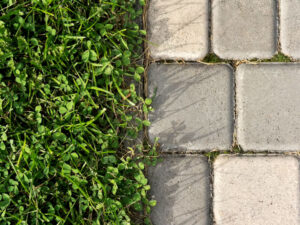 If you are a homeowner with a brick paver installation such as a driveway, patio, pool deck, or walkway, you might be wondering if you should seal your pavers. The short answer is yes, and in this article, we’ll explore why.
If you are a homeowner with a brick paver installation such as a driveway, patio, pool deck, or walkway, you might be wondering if you should seal your pavers. The short answer is yes, and in this article, we’ll explore why.
Brick pavers are known for their durability and attractive appearance, but neglecting maintenance can lead to a dull, weed and moss-covered hardscape that requires costly replacement. Exposure to elements and UV radiation can cause pavers to deteriorate and lose their original color quickly.
Paver sealing is a process that involves applying a protective coating to the surface of the pavers. This process not only helps to keep the original colors intact but also protects your investment in the long run and avoids future headaches.
Sealing your pavers can prevent further deterioration caused by harsh weather, salt damage, oil, grease, grime, and stains. It can also inhibit weeds and grass growth between the joints, deter ants and other insects, and reduce moss growth. Routine cleaning becomes easier as the sealant repels dirt and grime.
One of the most popular and recommended types of sealer is the wet look sealer, which gives the pavers a deep color enhancement, bringing back the original look and color of the pavers. This type of sealer is also UV resistant, which helps to retain the color of the pavers for a longer time.
It is important to note that neglected pavers can be saved, and sealing them can help restore their appearance. If you have neglected your brick pavers or inherited them when you bought your house, a timely restoration can make them look new again. However, proper preparation is crucial for successful adhesion of the sealer.
In conclusion, sealing your brick pavers is highly recommended as it protects your investment, retains the original color longer, inhibits weed growth, and repels insects, oil, and grime. It also enhances the color, texture, and brightness of the pavers and reduces surface deterioration and wear. Specialists advise homeowners to take advantage of paver sealing to extend the life and beauty of their hardscape.
Picture Credit: Freepik
